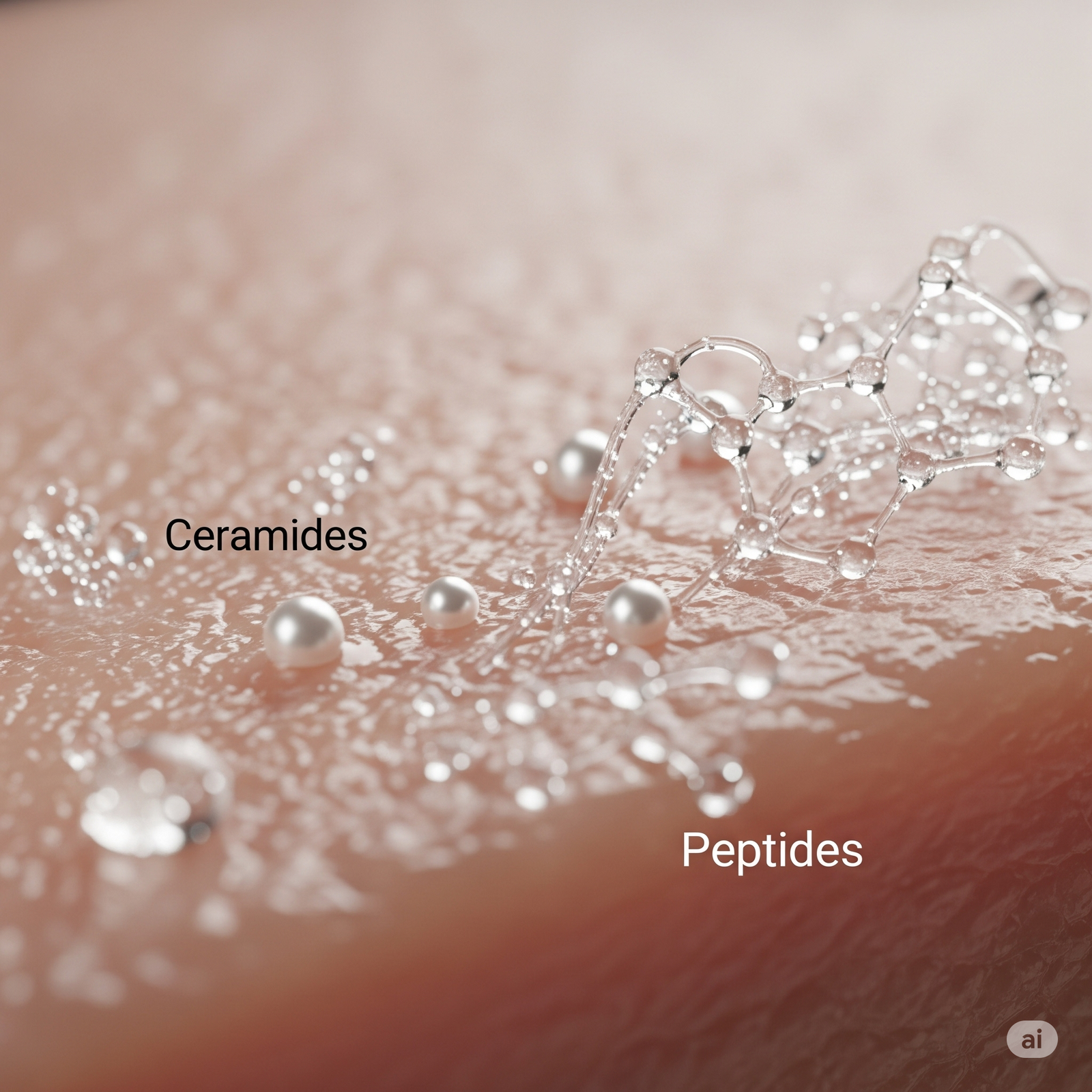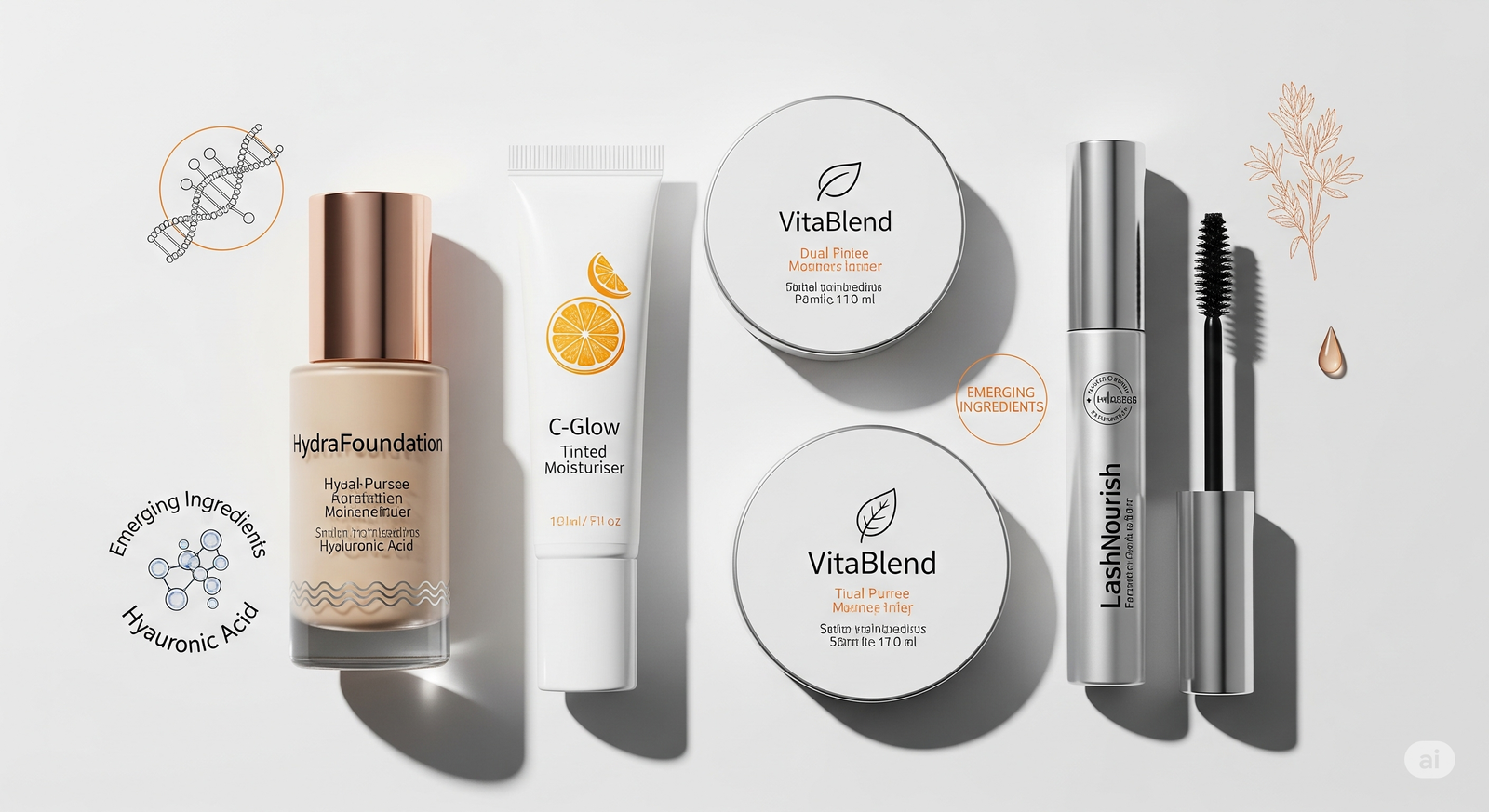Barrier Repair in 2025: The Science & The Surge
Scientific look at skin barrier trends, peptides, ceramides, and ROI for brands.
20 Aug'25
By Yugadya Dubey


Barrier Repair in 2025: The Science & The Surge
Picture this: it’s 11 p.m., you’re doomscrolling skincare TikToks, and suddenly every creator is swearing by “barrier repair creams” with peptides, ceramides, and biotech buzzwords you can barely pronounce. You’re not alone. If 2023 was about actives overload (hi, retinol and niacinamide layering), then 2025 is the year of slowing down—and building back up.
Welcome to the barrier repair era, where skincare isn’t about chasing instant glow but about long-term skin resilience. And trust us, the numbers, derms, and brands all agree: this isn’t just a trend—it’s science meeting strategy.
Why Everyone’s Suddenly Obsessed With Their Barrier
Your skin barrier is the invisible bouncer of your face—keeping hydration in, irritants out, and inflammation on mute. Overexfoliation, pollution, humidity, and yes, monsoon stress can all weaken it.
Gen Z and Millennials, burnt out from “10-step glow routines,” are shifting focus. A 2025 consumer pulse study showed:
- 73% of beauty shoppers prioritized “barrier-friendly” claims over “instant brightening.”
- 2 in 3 admitted to cutting down on harsh actives after sensitivity flare-ups.
- Barrier repair serums ranked #1 in repeat purchase category across Indian metros this monsoon.
Translation? Skinimalism now has a lab coat.
The Science: Peptides, Ceramides & Biotech Ingredients
So what’s actually inside those chic minimalist bottles everyone’s flexing on IG stories? Let’s break it down:
1. Peptides – The Skin’s Repair Signals
Think of peptides as tiny messengers telling your skin: “Hey, it’s time to heal.”
- Copper peptides: boost collagen, reduce redness.
- Oligopeptides: help strengthen barrier proteins. Peptides don’t just plump fine lines, they reprogram your skin’s defence system.
2. Ceramides – The Lipid Glue
Ceramides are basically your skin’s natural cement. Without them, it’s cracks and dehydration city. Adding them back in creams and serums makes skin stronger, bouncier, and way less irritated.
3. Biotech Powerhouses – The 2025 Twist
Brands are no longer extracting ceramides from wheat or cholesterol—they’re using precision biotech. Lab-grown ceramides and bio-fermented peptides mean more stable formulations, cruelty-free sourcing, and a green beauty halo.
Biotech Beauty Trend 2025 shows:
- Partnerships between indie brands and biotech labs doubled in the last year.
- Vegan ceramide serums are outperforming traditional moisturizers by 40% in user retention.
Barrier Repair = ROI for Brands
Here’s where it gets juicy for brands: barrier repair isn’t just good skin science—it’s smart business.
- Consumer Trust: “Barrier support” is a low-risk claim—derms back it, and users feel safer experimenting.
- Repeat Purchases: Barrier repair products are often staples, not seasonal buys.
- Cross-Category Growth: We’re already seeing barrier shampoos and scalp ceramide mists trending in Asia.
An ROI study revealed that brands investing in barrier-first messaging saw a 30% higher repeat customer rate compared to those pushing single-actives like retinol.
Carousel Content: Science vs. Hype
Want to decode the marketing overload? Picture this as a scrollable Instagram carousel:
- Slide 1: “Barrier Repair = Fad?” Myth Busted.
- Slide 2: Science: Peptides clinically shown to reduce TEWL (transepidermal water loss) by 35%.
- Slide 3: Hype: “Barrier reset in 24 hours” (lol, no cream can do that).
- Slide 4: Reality: Consistent use = visible results in 2–4 weeks.
Derm Q&A: Quick Fire
Q: Can peptides replace retinol?
A: No, but they’re gentler allies for firming skin without irritation.
Q: Are barrier products only for sensitive skin?
A: Nope. Everyone needs barrier care—especially in humid or polluted cities.
Q: How do I know if my barrier is damaged?
A: Signs include redness, tightness, flakiness, and sudden product stinging.
How to Build a 2025 Barrier Routine
If you’re looking to upgrade your shelf:
- Gentle Cleanser – low pH, sulfate-free.
- Barrier Serum – peptides + ceramides combo.
- Moisturizer – thicker if dry, gel-based if oily.
- SPF – because UV damage = barrier damage.
Pro tip: Less is more. No more 7 acids, 3 retinoids, and 4 essences in one go.
Admigos Spotlight: Innovation in Action
Admigos is at the forefront of mapping how biotech is shaping beauty. Our Barrier Repair Innovation Deck highlights:
- Brand collabs with biotech startups for custom ceramide complexes.
- Shoppable “repair starter kits” performing best on TikTok Shop India.
- Data-backed graphs showing skincare claims vs. actual user retention rates.
It’s not just ingredients—it’s consumer trust redefined.
The Bottom Line
The 2025 barrier repair surge isn’t another micro-trend—it’s the future of skincare that blends biotech precision with Gen Z’s demand for authenticity. Whether you’re a consumer trying to calm redness or a brand trying to build loyalty, barrier repair is where skin science and culture collide.
So next time you’re scrolling, and you see “peptide barrier cream” trending? Know that behind the cute packaging is hardcore science—and a promise your skin will thank you for.
— By Yugadya Dubey
How to Leverage Instagram for Your Beauty Brand in 2025
Strategies for effective Instagram marketing to capture Gen Z and millennial audiences.

The Rise of Skincare-Infused Makeup: Multipurpose Beauty in 2025
Explore the rise of skincare infused makeup in 2025. Discover how multifunctional beauty products define new beauty trends and how Admigos tracks brand innovation.
